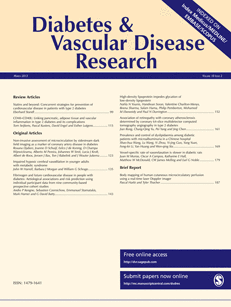
Diabetes & Vascular Disease Research
Scope & Guideline
Fostering collaboration for a healthier future in diabetes care.
Introduction
Aims and Scopes
- Diabetes and Cardiovascular Disease Interactions:
Researching the impact of diabetes on cardiovascular health, including the prevalence of heart disease among diabetic patients and mechanisms of cardiovascular complications. - Microvascular and Macrovascular Complications:
Exploring the pathophysiology, risk factors, and treatment approaches for complications associated with diabetes, such as diabetic nephropathy, retinopathy, and peripheral artery disease. - Innovative Therapeutic Approaches:
Investigating new medications, treatment regimens, and interventions aimed at managing diabetes and its vascular complications, including pharmacological studies and real-world applications. - Epidemiological Studies:
Conducting population-based studies to assess the incidence, prevalence, and risk factors associated with diabetes and its complications across different demographics. - Biomarkers and Molecular Mechanisms:
Identifying biomarkers and understanding the molecular pathways involved in diabetes and vascular dysfunction to facilitate early diagnosis and targeted therapy.
Trending and Emerging
- Role of Novel Therapeutics:
An increasing focus on the efficacy of novel diabetes medications, particularly sodium-glucose cotransporter-2 (SGLT2) inhibitors and glucagon-like peptide-1 (GLP-1) receptor agonists, in reducing cardiovascular and renal risks associated with diabetes. - Microvascular Complications and Inflammation:
Emerging research is highlighting the role of inflammation in the development of microvascular complications, such as diabetic retinopathy and nephropathy, leading to new therapeutic targets. - Integration of Technology in Diabetes Management:
The use of continuous glucose monitoring systems and digital health technologies is trending, with research exploring their impact on glycemic control and patient outcomes. - Psychosocial Factors in Diabetes Management:
There is a growing recognition of the importance of psychological and social factors in diabetes management, with studies investigating how these factors influence disease progression and treatment adherence. - Longitudinal and Cohort Studies:
A trend towards conducting longitudinal studies that track diabetes progression and its vascular complications over time, providing insights into long-term outcomes and risk factors.
Declining or Waning
- Historical Cardiovascular Risk Factors:
Research focusing on traditional cardiovascular risk factors in isolation, such as cholesterol levels or hypertension, appears to be waning as studies increasingly emphasize the interconnectivity between diabetes and broader health outcomes. - Basic Science Approaches without Clinical Applications:
There seems to be a decrease in purely basic science studies that do not directly translate to clinical practice or patient outcomes, as the journal shifts towards more translational research that impacts patient care. - Single-Factor Studies:
Studies that examine the effects of diabetes on vascular health in isolation without considering the multifactorial nature of these diseases are becoming less common, reflecting a trend towards a more holistic approach in research.
Similar Journals

Cardiovascular Diabetology
Innovating Solutions at the Intersection of Cardiology and DiabetesCardiovascular Diabetology is a prestigious open-access journal published by BMC, focusing on the intersecting fields of cardiology, endocrinology, diabetes, and internal medicine. Since its inception in 2002, this journal has established itself as a vital resource for researchers, clinicians, and academics dedicated to advancing knowledge in these areas. With an impressive impact factor reflected in its Q1 rankings for the year 2023 across its respective categories, including a ranking of 22nd in Cardiology and Cardiovascular Medicine and notably 15th in Internal Medicine, it positions itself at the forefront of scholarly communication. The journal encourages the dissemination and sharing of groundbreaking research, providing open access to foster engagement and collaboration among professionals globally. As it converges from 2002 to 2024, Cardiovascular Diabetology continues to be a pivotal platform for innovative studies, reviews, and critical insights that significantly impact clinical practices and medical education in the evolving landscape of cardiovascular health and diabetes management.
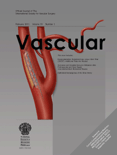
Vascular
Exploring the frontiers of cardiology and surgery.Vascular is a premier academic journal published by SAGE Publications Ltd, focusing on a wide range of disciplines within the fields of cardiology, cardiovascular medicine, surgery, and radiology. Established in 1993 and continuing through 2024, this journal serves as an essential resource for researchers and professionals seeking to advance their understanding of vascular health and disease. With an impressive categorization in the Q3 quartile for cardiology and cardiovascular medicine, and Q2 quartile for surgery, Vascular has established itself as a reputable platform for disseminating cutting-edge research and innovative clinical practices. The journal's positioning in various Scopus Ranks reflects its relevance and contribution to advancing these critical medical fields, making it an indispensable tool for students, clinicians, and researchers alike. For those interested in keeping abreast of the latest developments, Vascular offers a rich repository of articles that contribute significantly to the global discourse on vascular diseases.

EJVES Vascular Forum
Your Premier Source for Vascular Research ExcellenceEJVES Vascular Forum, published by Elsevier, is a premier open access journal focusing on the interdisciplinary field of vascular surgery and cardiovascular medicine. Since its inception in 2001, the journal has provided a vital platform for the dissemination of high-quality research and innovative clinical practices, addressing critical issues in vascular health. With an ISSN of 2666-688X, it has gained recognition within its community, attaining a Q3 quartile ranking in both cardiology and surgery categories as of 2023, and showcasing its relevance and impact within the medical research landscape. Situated in the United Kingdom and accessible globally, the EJVES Vascular Forum invites contributions that foster collaboration and enhance knowledge in vascular surgery, making it an essential resource for researchers, professionals, and students alike. The journal's ranking within Scopus highlights its position among peers, adding further credence to its objectives of advancing science and improving patient care in the cardiovascular realm. By publishing rigorously peer-reviewed articles, the journal aims to be the go-to source of information and innovation for those dedicated to the progress of vascular health.
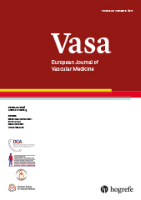
Vasa-European Journal of Vascular Medicine
Connecting Researchers and Clinicians in Vascular ExcellenceVasa - European Journal of Vascular Medicine is a leading peer-reviewed journal dedicated to advancing the field of vascular medicine, published by HOGREFE AG in Switzerland. With a proud history dating back to 1972, this journal serves as a critical platform for researchers, clinicians, and healthcare professionals committed to enhancing knowledge and practice related to cardiovascular health and vascular disorders. Holding a notable Q2 ranking in the cardiology and cardiovascular medicine category, Vasa’s scholarly contributions reflect high-quality research and innovative insights that drive clinical applications. The journal provides essential access to original articles, reviews, and case studies, fostering a vibrant exchange of ideas within the vascular medicine community. Its Scopus rank of #159 out of 387 further underscores its impact, placing it confidently in the 59th percentile among its peers. Vasa is synonymous with rigorous academic standards and relevance, making it an invaluable resource for anyone seeking to stay at the forefront of vascular research and its clinical implications.
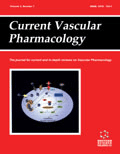
Current Vascular Pharmacology
Shaping the Future of Cardiovascular Pharmacological ResearchCurrent Vascular Pharmacology is a premier academic journal published by Bentham Science Publications Ltd, focusing on the intersection of pharmacology and cardiovascular medicine. With an impact factor that reflects its significance in the field, this journal ranks in the Q1 category for both Pharmacology and Cardiology, showcasing its dedication to high-quality research. Its Scopus ranks place it in the top percentile of its categories, highlighting its influence among scholars and practitioners alike. Issued since 2003 and continuing through 2024, Current Vascular Pharmacology aims to disseminate cutting-edge findings and foster knowledge exchange among researchers, professionals, and students engaged in cardiovascular pharmacology. Despite being a subscription-based journal, it remains a vital resource for those seeking the latest advancements in drug development and therapeutic interventions for vascular diseases. Located in the United Arab Emirates, the journal serves as an essential platform for global discourse on vascular health.
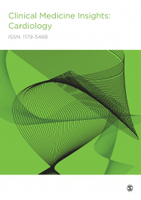
Clinical Medicine Insights-Cardiology
Unlocking Innovations in Cardiology for Global ImpactClinical Medicine Insights-Cardiology is a prestigious open-access journal published by SAGE Publications Ltd, focusing on cutting-edge research in the field of cardiology and cardiovascular medicine. With the ever-evolving landscape of cardiovascular health, this journal serves as a vital platform for disseminating significant findings, clinical practices, and innovative therapies. Established in 2007, it has rapidly gained recognition, currently ranked in the Q2 category for cardiology, positioned at #112 out of 387 in Scopus Rankings, and boasting a commendable 71st percentile. The journal not only emphasizes the integration of recent advancements in clinical and laboratory studies but also aims to bridge the gap between research and practice, making it an essential resource for researchers, healthcare professionals, and students alike. Situated in New Zealand and operating with an open-access model, Clinical Medicine Insights-Cardiology promotes the unrestricted dissemination of knowledge, ensuring that critical insights into cardiovascular medicine are accessible globally.

Diabetology & Metabolic Syndrome
Empowering research in endocrinology and beyond.Diabetology & Metabolic Syndrome is a premier open-access journal published by BMC, dedicated to advancing the field of endocrinology, diabetes, and metabolic syndrome. Since its inception in 2009, the journal has established itself as a leading platform for original research, reviews, and clinical studies, offering comprehensive insights into the complexities of metabolic diseases. With an impressive ranking in the 2023 category quartiles as Q1 in both Endocrinology, Diabetes and Metabolism, and Internal Medicine, it stands among the top-tier journals in its field. Researchers will appreciate its strong emphasis on disseminating critical findings that influence clinical practices and public health policies. Accessible to a global audience, Diabetology & Metabolic Syndrome's commitment to open access enables the distribution of high-quality research without barriers, fostering an inclusive environment for knowledge sharing. With a strategic focus on the intersection of diabetes management and metabolic disorders, this journal is essential for professionals seeking to stay abreast of the latest developments and contribute to a vital area of healthcare.

International Journal of Angiology
Bridging gaps in angiology through impactful research and dialogue.Welcome to the International Journal of Angiology, a distinguished publication dedicated to advancing the field of cardiology and cardiovascular medicine. Published by THIEME MEDICAL PUBL INC, this journal plays a crucial role in disseminating innovative research and clinical insights from 1992 through 2024, serving as a vital resource for researchers, healthcare professionals, and students alike. With an ISSN of 1061-1711 and an E-ISSN of 1615-5939, the journal currently holds a respectable Q4 ranking in the cardiology field, reflecting its commitment to quality and relevance. Although it operates under a traditional access model, the journal ensures that critical research findings are shared with a broad audience, fostering collaboration and knowledge exchange. By exploring current trends, diagnostic techniques, and treatment modalities in angiology, the International Journal of Angiology remains an essential platform for those dedicated to improving cardiovascular health around the globe.

Journal of Cardiovascular Development and Disease
Unleashing potential through open access to groundbreaking research.Journal of Cardiovascular Development and Disease, an esteemed publication by MDPI, has been a dedicated platform for disseminating cutting-edge research since its inception in 2014. Based in Switzerland, this Open Access journal not only provides unrestricted access to its content but also fosters global collaboration among scholars focusing on cardiovascular health and disease development. With an impressive focus classified as Q1 in Pharmacology, Toxicology and Pharmaceutics for 2023, it attracts a diverse range of interdisciplinary research, supporting advancements in pharmacological applications relevant to cardiac conditions. The journal's ongoing convergence through 2024 highlights its commitment to the evolving landscape of cardiovascular research, making it a vital resource for researchers, professionals, and students alike who are keen to contribute to and learn from significant developments in this critical field.
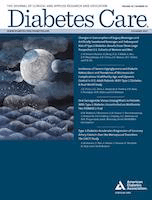
DIABETES CARE
Transforming knowledge into diabetes care solutions.DIABETES CARE, published by the American Diabetes Association, is a premier journal dedicated to advancing the understanding and management of diabetes and related metabolic disorders. Since its inception in 1978, this journal has maintained a commitment to disseminating high-quality research, evidenced by its prestigious ranking in the Q1 category across multiple fields including Advanced and Specialized Nursing, Endocrinology, Diabetes and Metabolism, and Internal Medicine. With an impressive impact factor and distinguished Scopus rankings, DIABETES CARE serves as an essential resource for researchers, clinicians, and students alike, facilitating the exchange of knowledge and fostering innovation in diabetes care. Although not an open-access publication, the journal offers various ways to access groundbreaking studies and advancements in the field. This commitment to excellence reflects the journal's vital role in shaping diabetes research and clinical practices globally.